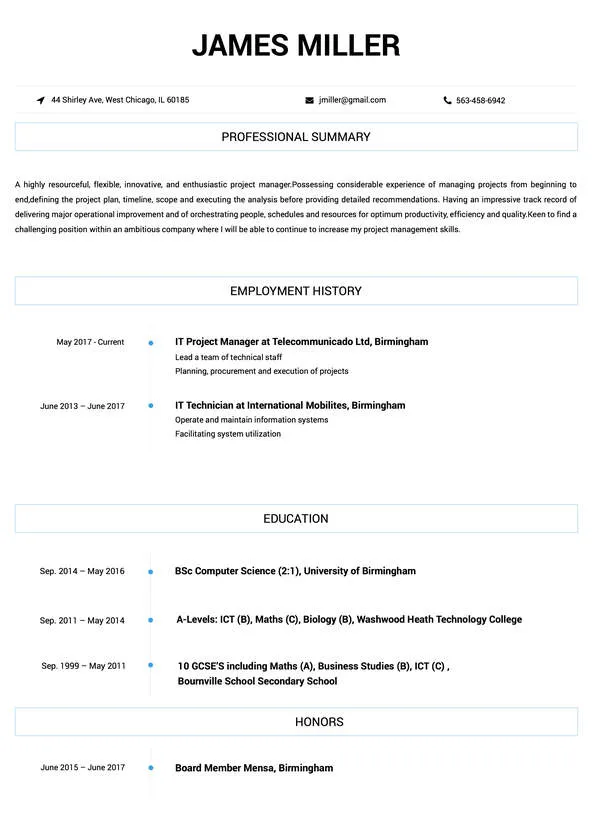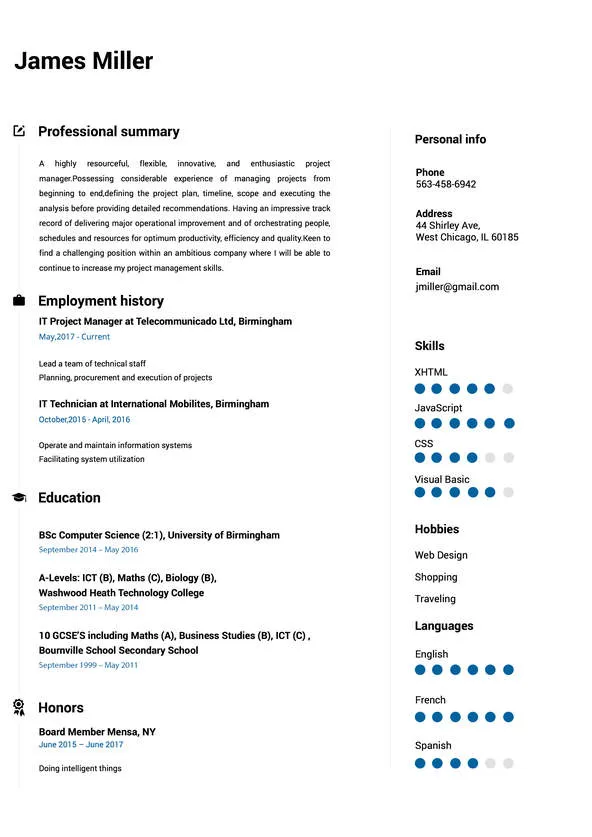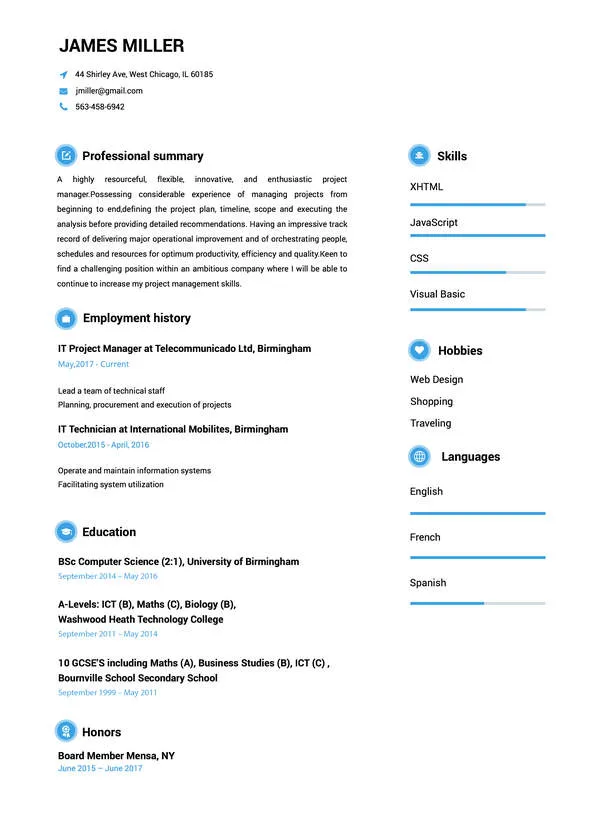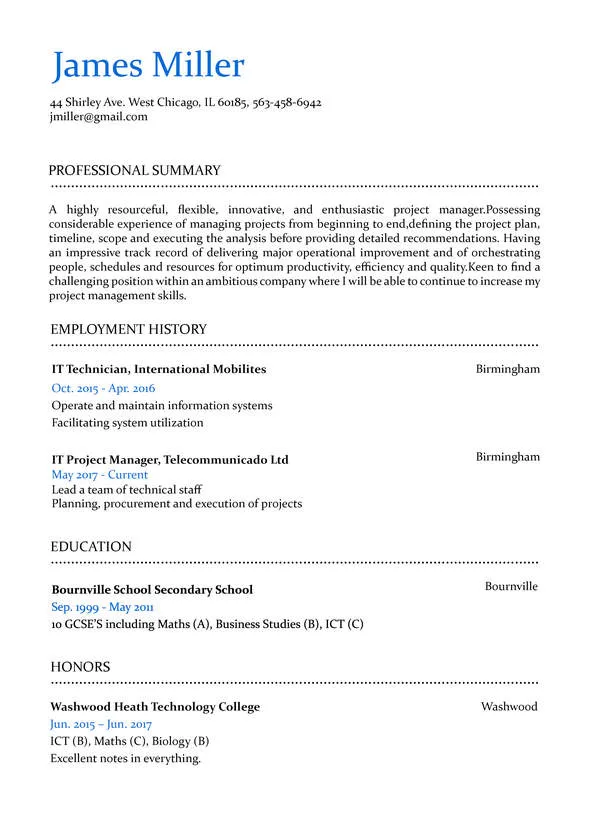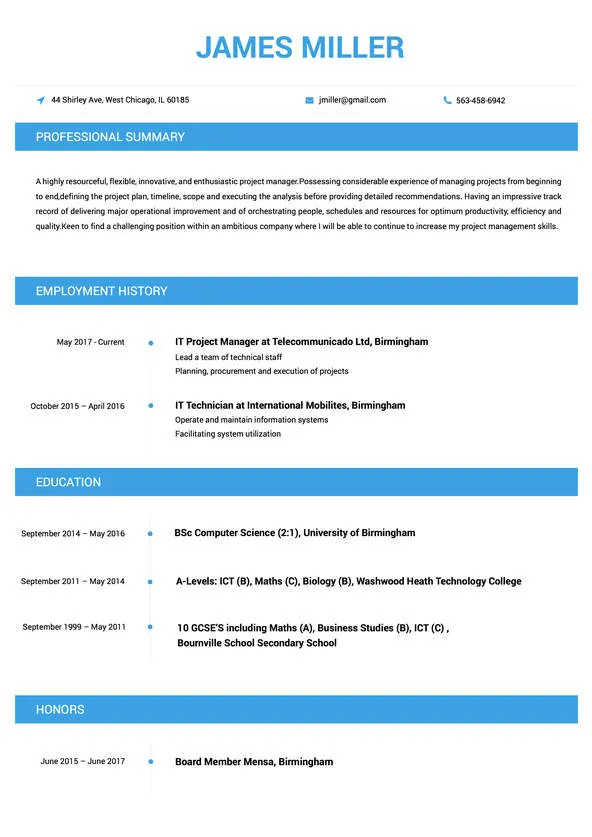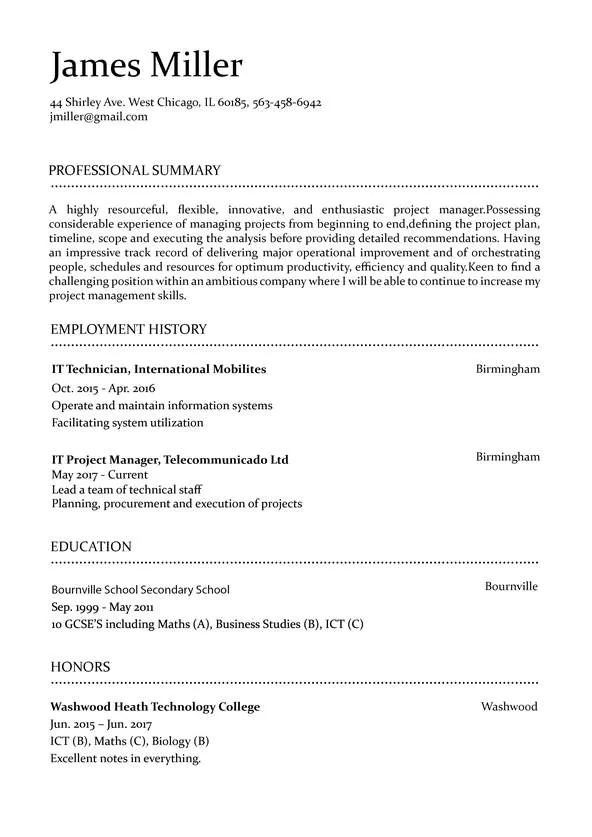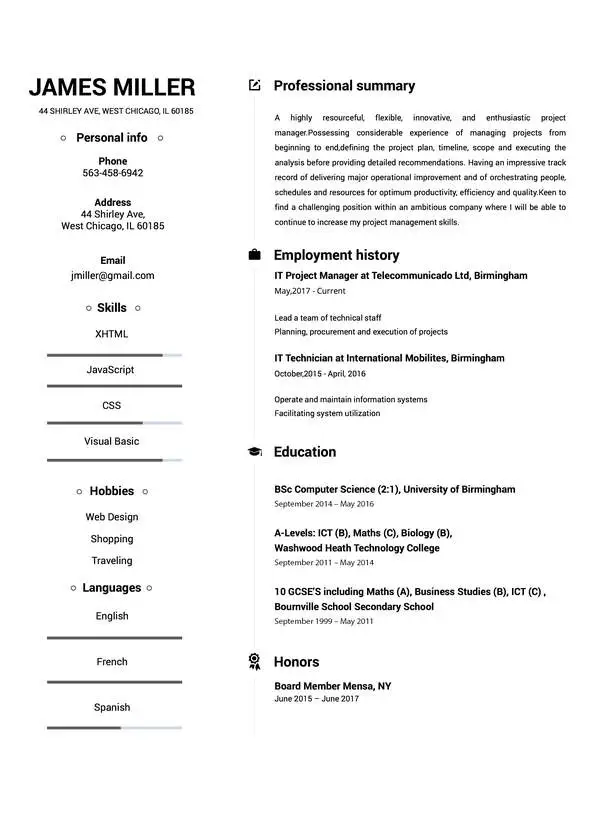 Use This Template
Use This Template
Build your resume in 15 minutes
Create an awesome resume that meets the expectations of potential employers with our selection of professional, field-tested resume templates.
product manager: Resume Samples & Writing Guide
Employment history
- Analyze customer feedback and market trends
- Monitor competitive landscape and market intelligence
- Manage product launches and releases
- Monitor and track product performance
- Create product documentation and user guides
- Lead customer research and usability testing
- Monitor competitive landscape and market intelligence
- Manage product lifecycle from concept to end of life
- Negotiate with vendors and suppliers
Education
Skills
Do you already have a resume? Use our PDF converter and edit your resume.
Employment history
- Develop product strategies and roadmaps
- Lead customer research and usability testing
- Monitor competitive landscape and market intelligence
Education
Skills
Employment history
- Manage product lifecycle from concept to end of life
- Collaborate with cross-functional teams to define product requirements
- Monitor and track product performance
- Develop and implement go-to-market plans
- Manage product launches and releases
- Create product documentation and user guides
- Create product documentation and user guides
- Develop product strategies and roadmaps
- Identify new opportunities and develop strategies to capitalize on them
Education
Skills
Employment history
- Collaborate with cross-functional teams to define product requirements
- Develop and maintain product budgets
- Manage product lifecycle from concept to end of life
- Create product documentation and user guides
- Develop product strategies and roadmaps
- Collaborate with cross-functional teams to define product requirements
- Analyze customer feedback and market trends
- Develop and implement go-to-market plans
- Monitor and track product performance
Education
Skills
Employment history
- Create product documentation and user guides
- Manage product lifecycle from concept to end of life
- Analyze customer feedback and market trends
- Analyze customer feedback and market trends
- Identify new opportunities and develop strategies to capitalize on them
- Monitor competitive landscape and market intelligence
- Identify new opportunities and develop strategies to capitalize on them
- Create and maintain product backlogs
- Analyze customer feedback and market trends
Education
Skills
Not in love with this template? Browse our full library of resume templates
As a product manager, you’re used to considering how all of the teams and elements of production development translate into a product that serves a customer. The good news is that those skills will serve you well when creating a product manager resume. That is, if you apply them in the right way.
In essence, your resume is the product, the sections and content are the product elements, and the customer is… well we’ll get to that in a moment. The key thing is to start the process of creating your resume with this mindset. You’ve already got the skills, you just need to communicate them effectively.
This guide is here to walk you through that process.
This guide will show you:
- Quality product manager resume templates to get you started
- What companies look for in a product manager resume
- What you can do to get your resume past ATS
- How to tailor your resume for recruiters
- The best formatting to use
- How long a product manager resume should be
- Which sections you’ll want to use
- How to highlight your achievements
- Which qualifications you should include
- The best hard and soft skills to include
- How to start your resume with a powerful objective or summary
- Which certifications you might want to include
- How to target your resume to a specific job
- Why a resume builder will help you get it all done faster and easier
Product manager resume template examples
Obviously there’s a lot to get right, but before you start writing your resume you need to get a feel for what the end product will look like. Imagine trying to build an airplane without having seen one and it should be clear why this is so important. You may be thinking “I’ve seen plenty of resumes” but chances are you haven’t seen many great ones.
The standard resume has changed a lot from the days of cookie-cutter Word docs. Today, employers increasingly expect resumes with more polish, better design, and more thought put into them. Have a look at these product manager resume examples to see what we mean. You can try listing what you like and don’t like about them before incorporating those ideas into your own resume.
[Examples]
How to write a product manager resume that will get you through the door
The goal of your resume is to show that you’ll be a great product manager for the specific role you’re applying to. That sounds obvious, but the difference is that your resume isn’t there to show you’re a good person, a generally good employee, or even a good overall product manager.
Getting hired requires targeting your resume and that process begins with understanding who it’s for.
Why creating an effective resume starts with understanding its audience
If your superior asked you who the intended audience of a product you were working on was and you said “everyone” you’d have your desk packed by the end of the day. A product for everyone is a product for no one, and a resume for every job is a resume for no job. If you’re going to get hired, you should be tailoring your resume to its audience.
But who is that audience? Ironically enough, it begins with more of a “what” than a “who.”
How to get your resume past ATS
Applicant Tracking Systems (ATS) are algorithms which quickly scan resumes to determine whether a human should review them or whether they should be discarded. For jobs that receive hundreds of applications, they’re an essential tool. The problem is that while ATS are becoming standard across industries, most applicants have no idea what they are or how they work.
The result is that an enormous number of resumes are unfairly rejected. One study found 62% of employers believed their ATS were rejecting qualified applicants. The key to ensuring you’re not one of them is following these simple steps for beating ATS.
- Submit a resume in the proper file format. This one is simple, submit a .doc, .docx, or .pdf to ensure you’re not giving an ATS a format it doesn’t know how to read.
- Use a resume builder to ensure the file is ATS-friendly. The way data is structured within a file has an enormous impact on how an ATS reads it. Columns, charts, images, etc. can all cause problems and lead to accidental rejections. Your best bet is to use a tool specifically designed to produce files that can be properly read by ATS.
- Use keywords wisely. The basic way ATS work is that they search your resume for specific words and phrases to determine your skills and experience. These are then compared to a set of criteria the ATS was given before. In other words, you want your resume to clearly match that criteria. Fortunately for you, there’s a simple guide to what they’re looking for: the job ad. Use the skills and experience listed in the job ad and incorporate them into your resume, mimicking the wording as closely as possible. Doing this makes the ATS’ job easy, it should be extremely clear that you meet the job criteria.
How to give recruiters what they’re looking for
After you get past ATS you still need to convince your resume’s second audience: the recruiter. Here is where you should be taking your product management skills and putting them to good use. Imagine the recruiter, what pressures do they have in selecting a candidate, what criteria are they using? How can your resume as a product match them as a consumer/audience?
In short, make their job easy. Look to the job ad again and make your resume match its requirements as closely as possible (luckily you should have already done this for ATS). Take frequent breaks to examine your resume while imagining you’re a recruiter. What do you notice and how can it be improved? There are other things you can do as well. The design and formatting should make your resume easy and pleasant to read.
The best formatting for a product manager resume
Formatting is a big deal, it’s all about how you structure the information on your resume. If a recruiter needs to look to a second or third page to see whether you have a certification required for the role, you’ve failed at formatting and the recruiter will not be happy. The best way to avoid this is to follow two rules.
The first is to put the most important information towards the top. If a recruiter can quickly and easily see you match the most important requirements for the job, you’ve just made their job easier. The second rule is closely connected to the first: list your experience in reverse chronological order. Your most recent work experience is the most relevant so it should go first.
How long should a product manager resume be?
This question is a bit like the question “how many features should this product have?” IE, more is not always better. A 3+ page resume is a bit like a product so full of features that it can barely do its core task anymore. That’s why the answer to the question of resume length isn’t fixed. A less experienced product manager should generally stick to one page, while someone with more experience might use two.
The rule of thumb to follow is to look at the content of your resume and ask whether it’s really adding value. Once additional content isn’t adding much to your resume, you can see how long it is and go from there. Just be sure not to throw in more content for its own sake, recruiter’s have limited time to review your resume and will not appreciate being forced to read through fluff and pointless details.
Which sections should you consider including?
Choosing the right sections to include should follow the same rules mentioned above. Only include those that you’re confident make your resume better by including vital information. That said, these are the sections a product manager should consider for their resume:
- Resume objective or summary
- Work experience
- Certifications
- Achievements
- Projects/Products
- Education
- Hard skills
- Soft Skills
What makes a great product manager resume?
The answer to this question is surprisingly simple, it should show you’re the right product manager for this specific role. That means demonstrating an attention to detail, the ability to synthesize all of your qualities into a succinct resume, good written communication, and the fact that you clearly paid attention to the specifics of the job ad. Nail all of those things, and you’ll be ready to get hired.
How to highlight your most important achievements
This is where too many product manager resumes fail. Instead of focusing on achievements, they focus on responsibilities. But the thing is, anyone can have responsibilities. Someone was responsible for the success of New Coke or the Galaxy Note 7’s battery, but responsibility and achievement are not the same.
So instead of focusing on responsibilities, get specific with how your involvement affected the product or project. Specifics will always have a greater impact on a recruiter and they show that you’re not going to be the kind of product manager who ignores details and insists things are fine. Let’s look at some examples to see this in action.
Lead product manager for Krups coffee makers, responsible for overseeing dozens of designers, engineers, and others. Launched one of the company’s most successful home espresso machines.
This both sounds impressive and falls flat. This example demonstrates how even impressive product management experience can sound underwhelming if it’s presented the wrong way. By emphasizing responsibilities and lacking any details on what “success” means in this case, a recruiter is left thinking “that sounds good, but what did you really do?” Let’s see that same experience written in another way.
Product manager at Krupp’s coffee division managing 4 teams and 67 employees. Spearheaded the launch of the ET351, the company’s first digital coffee maker, which increased overall coffee maker sales by 17% in its first year.
Now we know how many people you oversaw, what product you launched, why that product was a unique challenge, and what the result was. In other words, these two sentences managed to convey a lot of important information in a very small space, making a recruiter’s job easier.
What are ideal product manager job qualifications and how should you list them
While the qualifications you include on your resume should always be tailored to the job you’re using it to apply to, there are a few key areas to focus on. Employers will generally want to know these things:
- How many years of experience you have,
- Any relevant education (engineering or marketing degrees, an MBA, etc.),
- Your management style,
- Your general approach to product development,
- Your personality (it’s easier to hire someone who’s likeable),
- Any domain-specific knowledge.
How to include skills on a product manager resume
Experience is great, but the easiest place for an ATS or a recruiter to quickly evaluate your resume and compare it to other candidates is your skills. That’s why it’s best to list them in their own section, making it easy for anyone to quickly get a general feel for what you can do. This could be a simple list or a list with examples below each skill (again, specific examples will make your resume content more impactful.)
Either way, just be sure your skills match what’s asked for in the job ad. This applies all the way to how they’re phrased. Copying the wording of a specific skill helps ensure that an ATS or a recruiter will understand what you’re trying to say: that you are the best candidate. Let’s compare two examples to see the impact of specificity.
Works well with deadlines
It’s better than nothing, but simply listing this doesn’t tell an employer much of anything.
Works well with deadlines
-Completed 4/4 major products led at Krups on time
Adding just a few simple words make the skill far more impactful. A recruiter reading this will be able to really associate this skill with you instead of just scanning over it.
While your skills should always be customized, there are still some common skills you’ll want to consider including.
The best hard skills to mention
- Systems analysis
- Product marketing
- Agile, Kanban, Scrum, or other development systems
- UX
- Financial management (or profit and loss)
- Working with cross-functional teams
- Working under deadlines
- Scope management
- Product design
- Presentation and public speaking skills
- Iteration
- Microsoft Project
- Customer analysis
The best soft skills to mention
- Detail oriented
- Leadership
- Problem solving
- Working well under pressure
- Creativity
- Decision making
- Taking feedback
- Written and oral communication
Why your resume should start with an objective or summary
Above, we talked about the impact of putting the most important information on your resume first. The problem comes when there’s no easy way to include all of that information at the top, some of it might be related to certifications, others might be about education, skills, or experience.
The trick is to use a resume objective or summary as a flexible space to quickly highlight the most important information on your resume. This way, a recruiter has a sense of you as a candidate from the very beginning. It also allows you to better control the narrative of your resume by making a strong first impression. Let’s look at some examples of objectives and summaries to see which you should choose and how to write them.
How to write a resume objective
A resume objective is a single concise sentence which simply states what you aim to achieve with your product manager resume. The key word here is concise. A well written objective should fit lots of information into an easy to read sentence. This is a good choice for opening your resume if you’re also submitting a cover letter and / or if your resume doesn’t require any specific explanations (more on that in the next section). Let’s look at some examples.
I’m an experienced product manager who’s passionate about creating great customer experiences and building healthy team environments.
This resume objective is simply too vague to be useful. A recruiter will be left wondering what precisely “passionate about creating great customer experiences” really means in practice. This creates a first impression that you’re someone who’s all talk and little substance. Let’s see a better version:
Product manager with 6 years of SaaS experience developing 3 Fintech applications at Proxy Digital looking to improve the UX of Cole Digital’s Fintech product offerings.
This example takes another approach. Instead of focusing on giving lots of data about accomplishments (information which can fit easily elsewhere on the resume), it focuses on creating a narrative. It tells the reader that this resume is tailored for this specific position and gives a sense of purpose and intent. The recruiter knows what experience you have and how you want to use that in this new role.
How to write a resume summary
The basic difference between a resume objective and summary is that the summary is longer. But the more important difference is that a summary is what you use when there’s something you need to explain about your application and resume which can’t easily be done elsewhere. Common examples would be explaining a career change or gap in your work history.
Just remember that a resume summary should be just as information dense as an objective. It will be your first impression, so choose your words carefully. Let’s look at two examples to see this in action.
After working as a product engineer for 4 years, I took a break to obtain a degree in marketing in order to transition to a product manager. I’m now looking to begin a new career in that role at your company. Thank you for considering my application.
While this resume summary does a good job explaining a gap in work history and how this person came to apply for a product manager job, it has a few issues. The first is that it’s written in the first person (resumes should always be in the third person). More importantly, it’s too light on details and wastes time with thanking the reader. That recruiter’s time is precious so don’t waste it. Let’s see a better version of that summary.
Product engineer with 4 years experience returning to the workforce after obtaining a marketing degree, now looking to combine technical and marketing backgrounds to lead the product team at Vizio Labs.
This summary manages to be shorter while containing more important information. It specifies the skill sets they plan to use to succeed in the new role and mention the name of the company to ensure the recruiter knows this resume has been tailored. It sounds confident and competent.
Why including certifications and trainings can make the difference
As mentioned above, one of the best ways to boost the impact of your skills is to give examples. Certifications and other courses offer another way to both do this and communicate that you go above and beyond to demonstrate your knowledge. Lastly, they work well as a shorthand to quickly communicate a lot of information about your expertise, helping make the recruiter’s job easier.
But which certifications and training are best for product managers?
Top product manager certifications and trainings to include
- Digital Product Management Certification: Modern Fundamentals
- AIPMM Certified Product Manager (CPM) credentials
- Software Product Management
- Product Management Certification with Lean, Agile, and System Design Thinking
- Master of Science in product Management
- Certified Product Manager
- Product Management 101
- The Product Management Program
- Product Strategy
Fortunately, most of these courses are online and there are ones designed to hone existing skills or to give you a basis for getting started as a product manager.
How to target your resume for each application
If there’s one overriding piece of advice you take from this guide it’s to target your resume for each application. Matching your skills, experience, and wording to a specific job increases your chances of getting past ATS and getting hired. It means extra work, but considering how valuable getting a better job is, the work is well worth it.
The best technique is to begin by carefully reading the job ad several times and taking notes about which skills and experience it requires and other requirements you can pick up on. Then, try researching the company to better understand the work culture, values, and goals it might have for your prospective role. For example, they may have just had a poor product launch, in which case you may want to identify where they could improve and show that you have the qualities to help them do that.
How to make your resume stand out
Besides all of the tips we’ve already discussed, the single best way to make your resume instantly stand out is with great design. A clean, modern look which makes the resume content easy to digest makes you look thoughtful and forward looking relative to the competition which just printed out a 12 point font Word doc. The best way to get that design is by using a resume builder.
Why using a resume builder is a key to success
From ensuring your resume file is ATS-friendly to getting the best modern design possible, using a resume builder vastly simplifies the job application process. After all, you need to focus your time on understanding the company/role to which you’re applying and polishing your resume content until it’s perfect. Choosing a resume builder lets you leave the rest up to the experts.
Lastly, choosing a powerful resume-builder like Resumebuild.com communicates that you went above and beyond in the process. Companies won’t be looking to hire a product manager who does the bare minimum, so ensure it’s clear that you are not that candidate. Get all of this right and the perfect product manager job is waiting for you.
product manager Job Descriptions; Explained
If you're applying for an product manager position, it's important to tailor your resume to the specific job requirements in order to differentiate yourself from other candidates. Including accurate and relevant information that directly aligns with the job description can greatly increase your chances of securing an interview with potential employers.
When crafting your resume, be sure to use action verbs and a clear, concise format to highlight your relevant skills and experience. Remember, the job description is your first opportunity to make an impression on recruiters, so pay close attention to the details and make sure you're presenting yourself in the best possible light.
product manager/biomedical engineer
- Released “Community Monitoring”, a free cloud-based monitoring product used by over 5000 MongoDB clients.
- conducting existing customer survey and taking their opinion as a feedback and communicating back to Principals for more effective solution for the market and their demand.
- Conduct economic or commercial surveys to identify potential markets for products or services also include working with Dental managers for effective promotions and new product launches strategies
- Associating with various Dental community of dentist and IDA time to time to formulate strategies of existing as well as for new product forecast .
product manager
- Determine customers’ needs and desires by specifying the research needed to obtain market information.
- Recommend the nature and scope of present and future product lines by reviewing product specifications and requirements; appraising new product ideas and/or product or packaging changes.
- Assess market competition by comparing the company’s product to competitors’ products.
- Provide information for management by preparing short-term and long-term product sales forecasts and special reports and analyses; answering questions and requests.
product manager
- Participation in scrum, release planning, velocity tracking
- Maintain product development backlog
- Develop long-term product roadmap strategy
- Identify new product opportunities based on in-depth market research
- Define project scope, goals, and deliverables to ensure consistency with company strategy and commitments
- Document and diagram business processes, highlighting development areas
- Stakeholder reporting (burnups, adoption rates, project trends, build and test completion, budget planning)
product manager / marketing & multi-media
- Coordinate team efforts with sales, marketing and R & D to investigate market needs for bakery or food production equipment. Products ranged from small start-up equipment to full automation and robotics.
- Manage the full life cycle of products including internal product coordination and external support through in-house training and marketing programs targeting specific audiences.
- Manage specific product family’s on a daily basis which would involve project quoting, training, product application testing, researching new opportunities, writing PRD’s and improvement reviews.
- Successfully brought to market and patented a niche’ piece of equipment to help automate a bakery production process.
product manager
- travelling extensively withing the territory local/international to maintain proper touch base with user/prospects.
- Confer with multi functionality to resolve problems, such as accounting, invoicing, logistics, installations, and more.
- Highly approachable, proactive, resourceful and polite in presenting behavior
- Translate, document, and prioritize project requirements
product manager/biomedical engineer Job Skills
For an product manager/biomedical engineer position, your job skills are a key factor in demonstrating your value to the company and showing recruiters that you're the ight fit for the role. It's important to be specific when highlighting your skills and ensure that they are directly aligned with the job requirements, as this can greatly improve your chances of being hired. By showcasing your relevant skills and experience, you can make a compelling case for why you're the best candidate for the job.
How to include technical skills in your resume:
Technical skills are a set of specialized abilities and knowledge required to perform a particular job
effectively. Some examples of technical skills are data analysis, project management, software proficiency,
and programming languages, to name a few.
Add the technical skills that will get hired in your career
field with our simple-to-use resume builder. Select your desired resume template, once you reach the skills
section of the builder, manually write in the skill or simply click on "Add more skills". This will
automatically generate the best skills for your career field, choose your skill level, and hit "Save &
Next."
- Data Analysis
- Project Management
- Quality Assurance
- Database Management
- Business Acumen
- Process Improvement
- Technical Writing
- Strategic Planning
- Risk Management
- Software Development
- Agile Methodology
- UX Design
- Product Design
- Supply Chain Management
- Product Roadmapping
- Product Lifecycle Management
- Analytics
- User Testing
- Cloud Computing
- Market Research.
How to include soft skills in your resume:
Soft skills are non-technical skills that relate to how you work and that can be used in any job. Including
soft skills such as time management, creative thinking, teamwork, and conflict resolution demonstrate your
problem-solving abilities and show that you navigate challenges and changes in the workplace
efficiently.
Add competitive soft skills to make your resume stand-out to recruiters! Simply select
your preferred resume template in the skills section, enter the skills manually or use the "Add more skills"
option. Our resume builder will generate the most relevant soft skills for your career path. Choose your
proficiency level for each skill, and then click "Save & Next" to proceed to the next section.
- Communication
- Interpersonal
- Leadership
- Time Management
- Problem Solving
- Decision Making
- Critical Thinking
- Creativity
- Adaptability
- Teamwork
- Organization
- Planning
- Public Speaking
- Negotiation
- Conflict Resolution
- Research
- Analytical
- Attention to Detail
- Self-Motivation
- Stress Management
- Collaboration
- Coaching
- Mentoring
- Listening
- Networking
- Strategic Thinking
- Negotiation
- Emotional Intelligence
- Adaptability
- Flexibility
- Reliability
- Professionalism
- Computer Literacy
- Technical
- Data Analysis
- Project Management
- Customer Service
- Presentation
- Written Communication
- Social Media
- Troubleshooting
- Quality Assurance
- Collaboration
- Supervisory
- Risk Management
- Database Management
- Training
- Innovation
- Documentation
- Accounting
- Financial Management
- Visualization
- Reporting
- Business Acumen
- Process Improvement
- Documentation
- Relationship Management.
How to Improve Your product manager/biomedical engineer Resume
Navigating resume pitfalls can mean the difference between landing an interview or not. Missing job descriptions or unexplained work history gaps can cause recruiters to hesitate. Let's not even talk about the impact of bad grammar, and forgetting your contact info could leave your potential employer hanging. Aim to be comprehensive, concise, and accurate.
Employment history
- Identify new oppurtunities and develop stratagies to capitalise on them
- Create product documentaion and user guidess
- Develop product stratagies and roadmaps.
- Create product documentation and user guidess
- Monitor and track product performancce
- Identifty new oppurtunities and develope strategiess to capitalize on themm
- Identifiy new oppurtunities, and develop strategys to capitalise on them.
- Manage product pricin and positionin.
- Manage product launche's and releasess.
Education
Skills
Avoid Spelling Mistakes and Include your Contact Information
Missing contact information prevents recruiters from understanding you're the best fit for the position.
Key Insights- Make sure you're not missing contact information on your resume. That should include your full name, telephone number and email address.
- Make sure to use a professional email address as part of your contact information.
- Highlight your contact information and double check that everything is accurate to help recruiters get in touch with you.
How to Optimize Your product manager/biomedical engineer Resume
Keep an eye out for these resume traps. Neglecting to detail your job roles or explain gaps in your career can lead to unnecessary doubts. Grammar blunders can reflect negatively on you, and without contact information, how can employers reach you? Be meticulous and complete.
Employment history
- Develop product strategies and roadmaps
- Develop and maintain product budgets
- Negotiate with vendors and suppliers
- Develop and maintain product budgets
- Collaborate with cross-functional teams to define product requirements
- Lead customer research and usability testing
Education
Skills
Unexplained Year Gaps and Missing Job Experiences are a No-no
Gaps in your resume can prevent recruiters from hiring you if you don't explain them.
Key Insights- It's okay to have gaps in your work experience but always offer a valid explanation instead of just hiding it.
- Use the gap to talk about positive attributes or additional skills you've learned.
- Be honest and straightforward about the gap and explain it using a professional summary.
product manager/biomedical engineer Cover Letter Example
A cover letter can be a valuable addition to your job application when applying for an product manager/biomedical engineer position. Cover letters provide a concise summary of your qualifications, skills, and experience, also it also gives you an opportunity to explain why you're the best fit for the job. Crafting a cover letter that showcases your relevant experience and enthusiasm for the Accounts Payable role can significantly improve your chances of securing an interview.
Bain & Company
Boston, Massachusetts
Dear Hiring Committee
As a Product Manager with a proven track record of success in Business Management, I am excited to apply for the Lead Product Manager position at Bain & Company. I believe that my skills and expertise would make a valuable contribution to your team.
Throughout my life, I have been passionate about Financial Management and have pursued opportunities to make a difference in this field. My experience in various areas, not just in Business Management, has given me the opportunity to develop my skills in Problem Solving and Accounting, which I am excited to apply to the role at Bain & Company. I am eager to work with a team that shares my values and to help your organization achieve its well determined goals.
Thank you for considering my application for the Lead Product Manager position. With my skills and the amazing team at this organization, I am assured that I can contribute to your organization's success and make a meaningful impact. Looking forward to a future where we can work together.
Sincerely,
Gus Bailey
922-499-6901
[email protected]
Gus Bailey
Showcase your most significant accomplishments and qualifications with this cover
letter.
Personalize this cover letter in just few minutes with our user-friendly tool!
Related Resumes & Cover Letters

Build your Resume in 15 minutes
Create an awesome resume that meets the expectations of potential employers with our selection of professional, field-tested resume templates.

